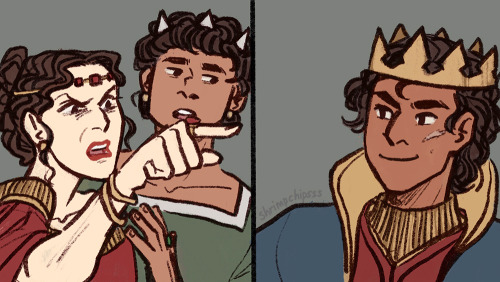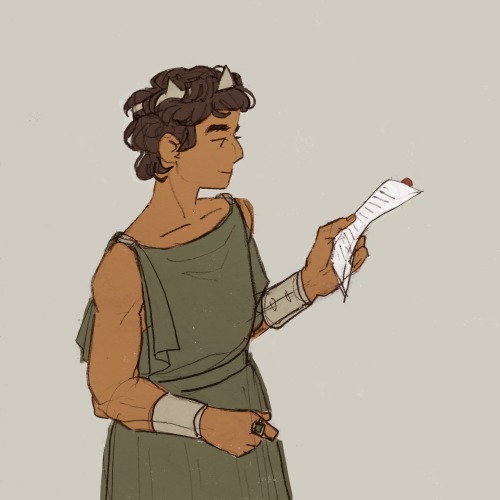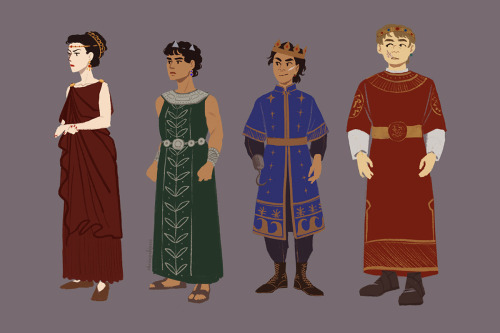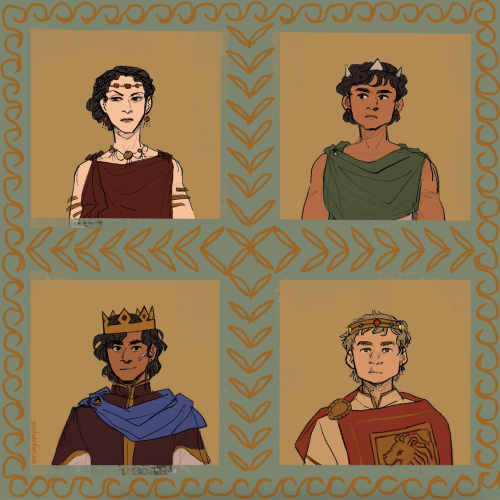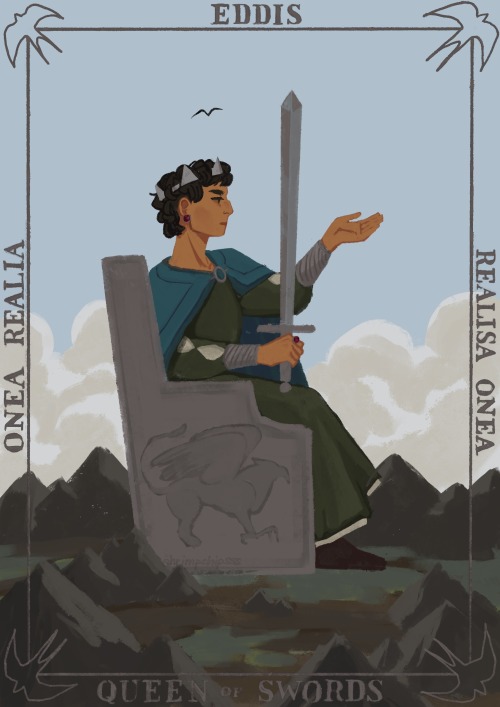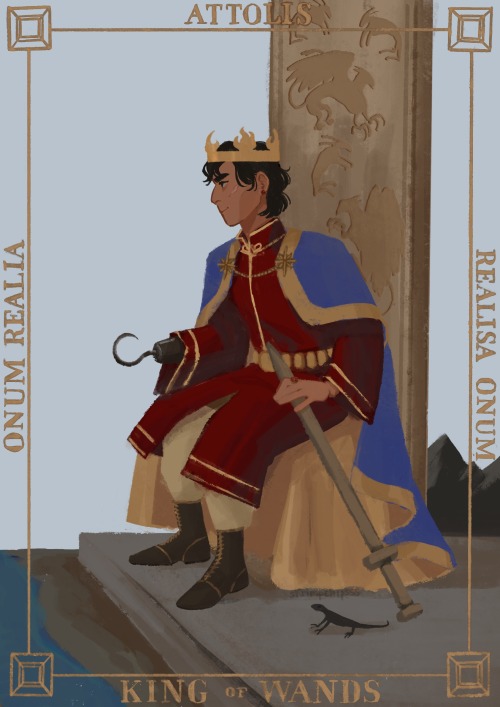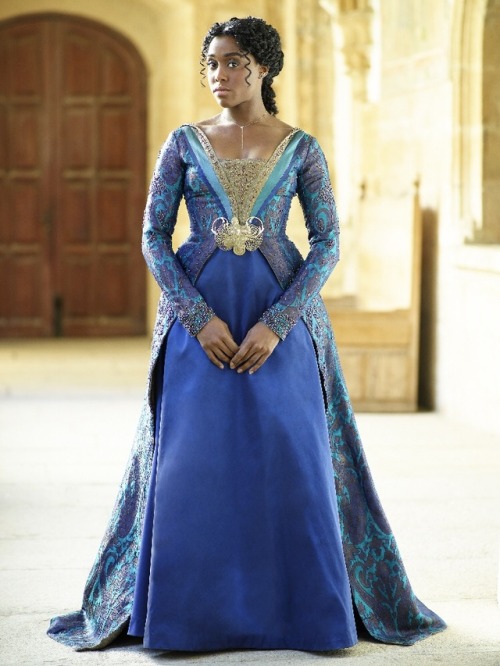#eddis helen
queens and kings of the minor arcana
Attolia—Queen of Cups / Eddis—Queen of Swords / Attolis—King of Wands / Sounis—King of Pentacles
Post link
I think a lot about Megan Whalen Turner’s use of monarchy in her novels and how that compares to royalty as presented in children’s fantasy fiction (as well as adult fantasy fiction, although I think there has been a strong turn away from rulers as absolute moral arbiters in the past twenty-five years, maybe, in favour of portrayals that are not necessarily more nuanced or realistic but are certainly more corrupt and far from divine) and Turner as a feminist writer and how these two aspects of her writing are interlinked. The nature of her approach to her Queen’s Thief series, however, requires a finer focus to begin from the wide view. While other authors world build with brick and mortar, Turner’s books create their world through origami. Each book is a separate piece and is folded into the next.
In “The Thief”, Turner starts by establishing the three kingdoms of the Little Peninsula: Sounis, Eddis, Attolia. King, Queen, Queen. Although “The Thief” is wholly Gen’s story, the King of Sounis appearing briefly at the beginning, the Queens of Attolia and Eddis appearing at the end, they are established as the powers that be, the decision makers, the three figures trying to maintain their country and their identity in balance with the martial and economic pressures from all out sides. We know little about any of the monarchs, beyond that Sounis is older and Eddis and Attolia are both young. That the young women are queens, not princesses, is immediately a quiet triumph, an eyeshiver of subverting the unquestioned status quo (you think now, as an adult, of all the uninterrogated eternal princesses in your media, the young women without fathers or with fathers specifically deceased, and the refusal to permit their ascension to an adult title).
Indeed, in “The Thief” it is impossible to envision them as princesses for they are not given names. This is not an oversight on Turner’s part, not a diminishment of their personhood or, at least, not a diminishment of personhood that is not considered part of the parcel of governance. The three monarchs are frequently referred to simply by the name of their country, even dispensing with King/Queen of [Country]. Of course this implies a degree of the individual as their country, their country as the embodiment of the individual, the placing of country before self which, in and of itself, calls on the typical mythos found coupled with a hereditary monarchy. But it also shapes the reader’s understanding of the dynamic between the three monarchs as equal. Queens instead of princesses is adult and the further step of country in lieu of title degenders them, allowing the reader to move beyond their expectations for these titles, these roles, based on previously consumed media or even an awareness of those monarchies which continue today.
It is easy to overlook these socially conditioned expectations; the woman who is a doctor but regularly addresses as “Ms.” without second thought versus the rudeness of anyone forgetting to address a man by his professional credentials. Turner lifts the reader away from expectations they may have for such archetypes as ‘king’ and ‘queen’ without any fanfare given for what she is doing.
Moving beyond the scope of the three monarchs, into the matter of Eddis and Attolia, the only female characters in “The Thief”. When the women appear, Turner sets up a familiar feminine binary between the two queens. Eddis is ugly but kind. Attolia is beautiful but cruel. Subsequent books prevent this from being a reductive portrayal of women without invalidating the initial descriptors. Eddis is never described as particularly attractive, but in certain eyes she is beautiful, without it ever seeming like a case of a perceptive/quality man perceiving a non-traditional beauty. Her kindness is tempered, prevented from being a weakness as she makes hard, sometimes ruthless decisions in “The Queen of Attolia” and those decisions are not motivated by possessing greater kindness than Attolia. Instead, she is equal to Attolia in her fierce love and protection of her country and its people. Attolia, the supremely beautiful woman who is cruel, is not the beautiful but evil queen not because she is not truly cruel, but because her cruelness is an expression of her ruthlessness. It is not petty, this is not a governmental expression of a Madonna-Whore dichotomy. It is two women who are physically very different operating in very similar roles with identical goals.
The physical difference is not significant; it is fact.
The important difference, the real dichotomy, is not a question of which of these women is good and which is evil, which woman is ugly and which is beautiful, which woman is pure and which is corrupt. It is, in fact, not a reflection of the women at all, but a reflection of the society and men around them.
More than the other books, the complete understanding of how Turner has taken superficial expectations of kings and queens and the portrayal of two women who, by existing in the same text will always in some way be positioned against each other, is achieved in “The King of Attolia”. Not, as might initially be thought in “The Queen of Attolia” in which the Wicked Queen is given the history and explanation that Explains her; for once we understand why she is wicked, will her actions not seem more understandable and forgivable? Turner in fact says no, Attolia’s cruel acts remain cruel; the nightmare consequences of one particular action continue throughout the series in the form of literal nightmares. “The Queen of Attolia” also gives Attolia a stand-in for someone who appears to be filling the role the evil advisor who leads a good woman astray for his own power and gain in the form of Nahuseresh.
“The King of Attolia” has a protagonist who is not of the nobility and from his perspective the reader gains a deeper understanding for how Attolia the country has been affected by Attolia the queen, the disruption of tradition rippling out to a disruption in the land and its greater politics. Initially, Attolia is a queen governing without a king, contrary to tradition. As a result, Attolia is surrounded by men wishing to control the country through her, their own schemes kept at bay by Attolia making ruthless example of a few individuals and setting the survivors against each other, focusing their attentions on the immediate threat of their peers rather than the abstract threat of not having direct control of Attolia yet. There is a sense given that the history of Attolia’s reign has been a steady escalation of ruthlessness as the scheming and the impatience of her barons persists and under the distraction of infighting, spies, beheading, and torture she secures alternate sources of power which strengthens the tie of loyalty binding the lower classes to her by instituting policies of a non-traditional nature like: meritocracy in the military, terms of indentured servitude having finite limits, and financial compensation for people working for the crown.
Attolia’s political actions, once the reader comes to understand them, are actions which elevate the powerless in her country and in doing so it enables to cement her own power: the power of one who, traditionally, would also be powerless. That we only become aware of this, truly appreciating the impact of Attolia as queen, instead of just the difficulties and hardships personally suffered, from the point of view of an insignificant young soldier and guard, who both fears and is loyal to the queen, imbues this interpretation of Attolia as one of greater truth than what is shown in the previous books. The narrator of “The King of Attolia”, Costis has a simpler view of the matter, a man on the ground view. He has no experience of living under the rule of anyone but this queen. He is not affected by the wider inter-country politics, his position is one formed by experiencing Attolia’s rule. It does not read as propaganda or apologia for the actions of this woman which are influenced by our ancient history and the politics therein.
Turner’s series has now come to an end and the number of main female characters never expanded beyond Eddis and Attolia but, in a genre that frequently fails women, even now, Eddis and Attolia are nuanced characters, powerful characters stretching the expectations of their archetypes and growing beyond them. The way Turner constructs her novels builds slowly and subtly into works that are feminist, despite the predominance of male characters, and strong with class solidarity and an anti-monarchial bent, despite the majority of the protagonists and point of view characters being members of the nobility. The genre and demographic do not need to steer the politics and ideas of a narrative and, in turn, those aspects cannot be accurately represented by simple numbers and Megan Whalen Turner demonstrates this often overlooked truth with each of her books.
Gen: Uh, I think I got your lunch. [Holds up a note that reads: ‘I am very proud of you. Love, the Minister of War]
Eddis: Oh yeah. I didn’t think this was for me. [Holds up a note that reads: ‘Be good. For the love of God, please be good.’]
Eugenides: Ugh! Attolia is the worst! I can’t believe I’m gonna marry her.
Eddis: Well, you don’t have to.
Eugenides: No, I’m gonna.

